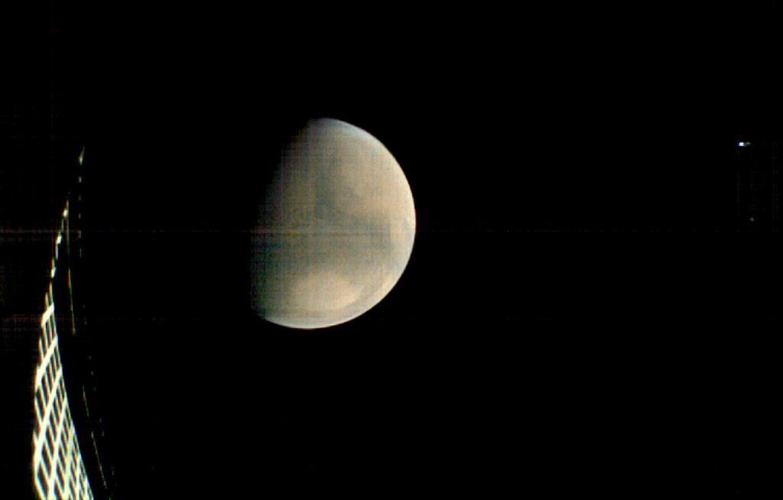PITTSFIELD — Rick Welch wants you to follow your passion, even if it takes you to Mars.
That's what happened to the Pittsfield native managing NASA's latest mission to the red planet.
He said his evolution from math-minded Pittsfield High School Student to space explorer happened by chance.
He studied engineering at Berkshire Community College and got a series of additional degrees from the University of Massachusetts Amherst. Then, he flew to California and fell in love with robot rovers in a sandbox at NASA's Jet Propulsion Laboratory in Pasadena.
At heart, he said, he's "a kid who still loves to play with Legos."
"The space aspect of it was sort of secondary," he said.
As NASA's InSight mission manager, Welch, 55, is heading up the machinery behind the agency's most recent trip to Mars. The rover that landed Nov. 26 is the fifth robot he's helped send to the fourth planet from the sun.
Vehicles like this one are "robotic geologists," he said, and the InSight lander in particular is designed for seismometry. By studying the seismic patterns of another planet, he said, scientists can diversify their knowledge and draw deeper conclusions about how we got here.
"The surface of Mars is different. It hasn't changed in billions of years, which is hard to believe," he said. "Understanding that can help scientists understand how all planets form."
Rising above
People in the Pittsfield community said Welch was always notably smart.
Barry Clairmont, certified public accountant and former city councilor, said he grew up with Welch and remembers being wowed in class by the projects he'd come out with.
"He was a math and science genius compared to the rest of us kids," he said.
Welch was born in 1963 and remembers the 1969 moon landing, "so like every other kid, astronaut was on the list of things I wanted to be when I grew up." But he said space exploration wasn't anything he ever thought seriously about.
He graduated from PHS in 1981, got an associate degree in engineering from BCC in 1985, and then went to UMass Amherst, where he earned a bachelor's degree, a master's degree and his doctorate in philosophy in mechanical engineering.
John Dixon, a UMass professor, helped him get an interview with NASA's Jet Propulsion Lab in California in 1992.
His passion was for the machines that the agency was building, he said, and his interest in space exploration didn't take off until the Mars Pathfinder mission, launched in 1996. At that point, he said he began to appreciate the universal impact of the work.
"I was like, 'Wow, we can actually build things that can go to other planets,'" he said. "I've been doing Mars missions ever since."
Anything is possible
With regard to last month's martian landing, he noted the "seven minutes of terror" that ensued while watching the equipment he'd worked on for years break the red planet's atmosphere, and make its way to the surface.
"Seeing those first pictures actually come back from one of these missions — that really is the big payoff," he said. "We're seeing things that no one has seen before."
He and his colleagues typically spend five years preparing for a launch, he said, between designing, engineering and testing. To test the space-traveling machines, Welch and his team run them in test chambers that mimic martian conditions.
Perhaps most notable among those conditions is the significant daily temperature swing; the planet is about 100 degrees cooler at night than it is during the day.
By earthly standards, it takes six months for the equipment to arrive on the red planet after launch. Unfortunately, he said, the robots he builds leave Earth and never come back.
"It's a one-way trip for all of our robotic vehicles," he said. "We leave all our little rovers on the surface of Mars."
Because of that, he said NASA's engineers build them to last. Ideally, the robots will last for at least two years — in Earth time, but only one in Mars time — and gather data all the while.
This latest mission is aimed at understanding the Mars interior, listening for quakes and assessing the planet's "crustal thickness." To accomplish this, he said, the InSight lander will stay in one spot as scientists listen to quakes for as long as they can, and gather information about them.
The agency's work on Mars hasn't come without its hiccups, he said, but "failure is part of the business."
"These vehicles are basically one of a kind," he said.
Other Mars missions he's worked on include Pathfinder, Curiosity, Phoenix and another mission yet to launch.
NASA's first-ever Mars mission, Viking 1, launched in 1975.
"I still remember, I had the National Geographic stashed away somewhere," he said.
Mars missions were then placed on a back burner for two decades, he said, until Mars Pathfinder.
"Some days it's just a job," he said, but then when it comes time to launch or land, he's reminded of the "tremendous achievement it really is."
"It always makes me take a deep breath," he said, "and just say, 'Wow.'"
The time needed to arrive at interplanetary destinations would require a tremendous amount of infrastructure to support human travel, he said, but "anything's possible."
Back in `the Pitts'
Welch said he returns home to Pittsfield every July to visit the in-laws and catch the annual Fourth of July Parade.
"We called it `the Pitts' when I was in high school, but it was a great place to grow up," he said.
The city may have changed some since Welch grew up, but he said dreams that take root in Pittsfield can take still take kids where they want to go.
"It's a big world and it's a big universe and there's lots of different things to explore out there," he said. "Find something that interests you and follow that interest, wherever it leads you."
At BCC, he found inspiration in the late Anne Wojtkowski, an engineering professor who later served as the city's mayor. Not a lot of women worked in engineering back then, he said.
"Because of her enthusiasm and her background, she was showing anyone could do that," he said. "Obviously, the number of women in engineering has grown a lot over the years."
Welch said his father spent his career at Berkshire Life Insurance, and no one else in his family worked in engineering until he and his brother both went that route. He remembers a lot of his peers' parents working at General Electric Co., though.
Bill Coan, the principal at PHS when Welch attended the school, said the many parents working for GE contributed to a "technical bent" that permeated Pittsfield.
Coan said Welch was quiet, and a "good, hard-working student."
Welch said he remembers that adults told him engineering was the path for him because he was so good at math and science.
It's good, he said, to see people get so excited about NASA's work on Mars — young people especially.
"At schools — one of the biggest kicks I get is the look in kids' eyes," he said.
He said he enjoys showing kids that "a bunch of people who work really hard together can make seemingly impossible things happen."
Amanda Drane can be contacted at adrane@berkshireeagle.com, @amandarane on Twitter, and 413-496-6296.





